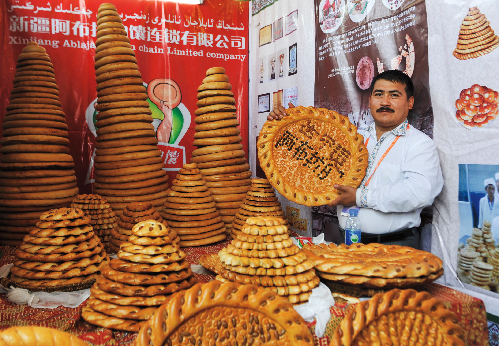|
 |
|
BREAD BASKET: A Uygur trader sells golden naan at the China-Eurasia Expo |
Urumqi took the global spotlight in early September as thousands of people flocked to the Xinjiang Uygur Autonomous Region capital for the Second China-Eurasia Expo, held September 2-7.
The event aims to promote cooperation between Asian and European countries, particularly China and Central Asia. Thousands of participants from 55 countries and regions attended the Expo, including high profile leaders such as Chinese Premier Wen Jiabao and former British Prime Minister Tony Blair.
Premier Wen's speech at the opening ceremony on September 2 centered on four points: enhancing political trust, opening markets to promote development, advancing cooperation in cross-border infrastructure and deepening cultural and people-to-people exchanges. He stressed Xinjiang's unique geographical advantage in facilitating exchanges between China and Eurasian nations, as well as the significance of reviving the ancient Silk Road, a historical network of interlinking trade routes across the Afro-Eurasian landmass that connected East, South and Western Asia with the Mediterranean and European world, as well as parts of North and East Africa.
"Two thousand years ago, our ancestors overcame numerous hardships and blazed the world-famous Silk Road," said Wen. He went on to say the Silk Road represents an achievement shared by all Eurasian people and the same pioneering spirit of the past is needed to rebuild the glory of the Silk Road and contribute to a better future of the Eurasian people.
The opening ceremony kicked off six days of conferences and panel discussions, cultural exhibitions and of course, the Expo itself - a trade fair with goods and vendors from all around the world. Activities were held in various locations around Urumqi, but mostly at the sprawling Xinjiang International Conference and Exhibition Center. This year's theme was "Harmonious Development and Win-Win Cooperation" - a slogan that could be seen on banners all around the city.
Shanghai Cooperation Organization
One of the cornerstone events at the Expo was the Shanghai Cooperation Organization (SCO) Business Day conference on September 3. The SCO was established in Shanghai in 2001 to promote security, economic and cultural cooperation between China, Kyrgyzstan, Kazakhstan, Russia, Tajikistan and Uzbekistan. At SCO Business Day, panel discussions centered on cooperation to increase trade between these nations.
Li Jinzao, China's Vice Minister of Commerce, opened the conference with an address urging SCO members to cooperate and work together on customs and e-commerce. He pointed out that a lack of coordination has led members to waste money on the "inconvenience costs" of trade that can cost three to four times as much as tariffs and urged members to have more discussions in order to aid cross-boundary investment and trade opportunities. Sharif Rahimzoda, Chairman of the National Bank of Tajikistan, agreed. "Within the SCO, we have tremendous opposition to improve cooperation," said Rahimzoda. "We need to maintain strong and stable growth. The results of cooperation have given us impetus for further economic growth."
Speakers also pointed out the advantage of Xinjiang's unique location, bordering Russia, Kazakhstan, Kyrgyzstan and Tajikistan, and its ability to facilitate commerce between China and other SCO states. "Xinjiang has a lot of financial resources," said Yuan Li, Vice President of China Development Bank. "It is the financial hub linking Asia with Europe." He discussed the possibilities of expanding cooperation in the energy and banking industries, as well as utilizing SCO cooperation to promote emerging markets. Rahimzoda echoed this sentiment. "Within the SCO framework, we need to resort to trade as a way to create more jobs and build stronger economies," he said.
|